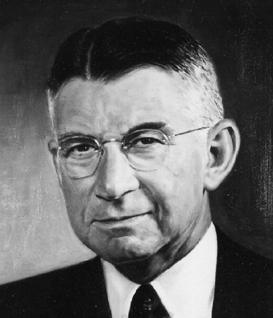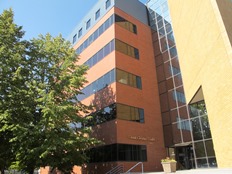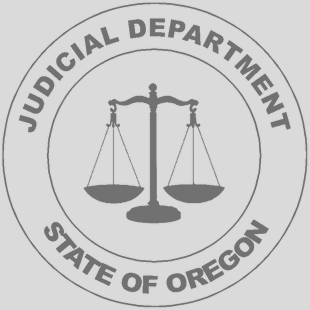An urban growth boundary (UGB) is a regional boundary, set in an attempt to control urban sprawl by, in its simplest form, mandating that the area inside the boundary be used for urban development and the area outside be preserved in its natural state or used for agriculture. Legislating for an urban growth boundary is one way, among many others, of managing the major challenges posed by unplanned urban growth and the encroachment of cities upon agricultural and rural land.

James Douglas McKay was an American businessman and politician from the U.S. state of Oregon. He served in World War I before going into business, where he was most successful as a car dealership owner in Salem. A Republican, he served as a city councilor and mayor of Salem before election to the Oregon State Senate. McKay served four terms in the state senate, also served stateside with the rank of major in the U.S. Army during World War II, and was then elected as the twenty-fifth governor of Oregon in 1948. He left that office before the end of his term when he was selected as the thirty-fifth U.S. Secretary of the Interior during the Eisenhower administration. McKay's conservative policies were denounced by environmentalists; they forced his resignation in 1956.

A Metropolitan Planning Organization (MPO) is a federally mandated and federally funded transportation policy-making organization in the United States that is made up of representatives from local government and governmental transportation authorities. They were created to ensure regional cooperation in transportation planning. MPOs were introduced by the Federal-Aid Highway Act of 1962, which required the formation of an MPO for any urbanized area (UZA) with a population greater than 50,000. Federal funding for transportation projects and programs are channeled through this planning process. Congress created MPOs in order to ensure that existing and future expenditures of governmental funds for transportation projects and programs are based on a continuing, cooperative, and comprehensive ("3-C") planning process. Statewide and metropolitan transportation planning processes are governed by federal law. Transparency through public access to participation in the planning process and electronic publication of plans now is required by federal law. As of 2015, there are 408 MPOs in the United States.
Regional Planning Councils (RPCs) are quasi-governmental organizations that, up until 2010, were designated by Florida law (Ch. 186, Florida Statutes) to address problems and plan solutions that are of greater-than-local concern or scope, and are to be recognized by local governments as one of the means to provide input into state policy development. With regard to transportation-related issues, RPCs are empowered to provide technical assistance to local governments on growth management matters; coordinate land development and transportation policies in a manner that fosters region-wide transportation systems; review local government comprehensive plan amendments, evaluation/appraisal reports, and Developments of Regional Impacts for consistency with state and regional plans; and, review the plans of independent transportation authorities and metropolitan planning organizations to identify inconsistencies between those plans and applicable local government plans. RPCs are a type of Regional planning organization, specific to the state of Florida. Since 2010, RPCs have evolved beyond growth management activities to serve their local governments across a variety of program areas, including economic development, environmental planning, emergency preparedness, disaster resiliency, GIS/technology services, housing, and transportation.
The Sierra Nevada Alliance is a network of conservation groups encompassing 24 watersheds of the 650 kilometer-long Sierra Nevada in California and Nevada. Beginning in 1993, the Alliance protects and restores Sierra Nevada lands, watersheds, wildlife and communities.

The Wisconsin Department of Natural Resources (WDNR) is a government agency of the U.S. state of Wisconsin charged with conserving and managing Wisconsin's natural resources. The Wisconsin Natural Resources Board has the authority to set policy for the WDNR. The WDNR is led by the Secretary, who is appointed by the Governor of Wisconsin. The WDNR develops regulations and guidance in accordance with laws passed by the Wisconsin Legislature. It administers wildlife, fish, forests, endangered resources, air, water, waste, and other issues related to natural resources. The central office of the WDNR is located in downtown Madison, near the state capitol.

Norma Jean Paulus was an American lawyer and politician in the state of Oregon. A native of Nebraska, she was raised in Eastern Oregon before becoming a lawyer. A Republican, she first held political office as a representative in the Oregon House of Representatives, and then became the first woman elected to statewide public office in Oregon when she became Oregon Secretary of State in 1977. Paulus later served as Oregon Superintendent of Public Instruction for nine years. She made unsuccessful bids to become Governor of Oregon and United States Senator. Prior to her death on February 28, 2019, Paulus lived in Portland, where she was involved with several non-profit groups and sponsored a ballot measure to create open primaries in Oregon's statewide elections.

The secretary of state of Oregon, an elected constitutional officer within the executive branch of the government of the U.S. state of Oregon, is first in the line of succession to the governor. The duties of the office are auditor of public accounts, chief elections officer, and administrator of public records. Additionally, the secretary of state serves on the Oregon State Land Board and chairs the Oregon Sustainability Board. Following every United States Census, if the Oregon Legislative Assembly cannot come to an agreement over changes to legislative redistricting, the duty falls to the secretary of state.
The Oregon Business Development Department (OBDD) dba Business Oregon is a government agency of the U.S. state of Oregon, providing support of economic and community development and cultural enhancement through administration of a variety of programs of incentives, financial support, and technical assistance to businesses, nonprofit organizations and community groups, industries, and local and regional governments and districts.

The Oregon Department of Agriculture (ODA) is responsible for agriculture in Oregon. This agency of the government of the U.S. state of Oregon promotes and regulates food production and safety. It is headed by the director of agriculture, appointed by the governor of Oregon, subject to confirmation by the senate, advised by a board of ten members, and gubernatorial appointees. Through its nine divisions, it administers no fewer than 36 chapters of Oregon laws.
The Oregon Department of Environmental Quality (DEQ) is the chief regulatory agency of the government of the U.S. state of Oregon responsible for protecting and enhancing the state's natural resources and managing sanitary and toxic waste disposal. The agency employs approximately 700 scientists, engineers, technicians, administrators, and environmental specialists. It has headquarters in Portland, regional administrative offices in Bend, Eugene, and Portland; and field offices in Coos Bay, Medford, Pendleton, Salem, and The Dalles. The Laboratory and Environmental Assessment Division operates an environmental laboratory in Hillsboro. The agency's director has the authority to impose fines for violations of the state's anti-pollution laws. In addition to its state mandate, the United States Environmental Protection Agency (EPA) has delegated authority to DEQ to administer federal environmental programs including the federal Clean Air Act, Clean Water Act, and Resource Conservation and Recovery Act within the state.

The Oregon Public Utility Commission (PUC) is the chief electric, gas and telephone utility regulatory agency of the government of the U.S. state of Oregon. It sets rates and establishes rules of operation for the state's investor-owned utility companies. With respect to publicly owned utility districts and cooperatives, its authority is limited to safety regulations.

The Hawaii Department of Land and Natural Resources (DLNR) is a part of the Hawaii state government dedicated to managing, administering, and exercising control over public lands, water resources and streams, ocean waters, coastal areas, minerals, and other natural resources of the State of Hawaiʻi. The mission of the Hawaiʻi Department of Land and Natural Resources is to "enhance, protect, conserve and manage Hawaiʻi's unique and limited natural, cultural and historic resources held in public trust for current and future generations of the people of Hawaiʻi nei, and its visitors, in partnership with others from the public and private sectors." The organization oversees over 1.3 million acres of land, beaches, and coastal waters and 750 miles of coastal land.

The Oregon Judicial Department (OJD) is the judicial branch of government of the state of Oregon in the United States. The chief executive of the branch is the Chief Justice of the Oregon Supreme Court. Oregon’s judiciary consists primarily of four different courts: the Oregon Supreme Court, the Oregon Tax Court, the Oregon Court of Appeals, and the Oregon circuit courts. Additionally, the OJD includes the Council on Court Procedures, the Oregon State Bar, Commission on Judicial Fitness and Disability, and the Public Defense Services Commission. Employees of the court are the largest non-union group among state workers.

The U.S. state of Oregon has had an evolving set of laws affecting land ownership and its restrictions.

The Oregon Board of Forestry is responsible for forest policy and oversight of forest management practices within the state of Oregon. The board appoints the state forester and oversees the Oregon Department of Forestry. The board also works with private land owners and the Federal Government to promote consistent forest management policies throughout the state.
The Oregon Land Conservation and Development Act of 1973, formally Oregon Senate Bills 100 and 101 of 1973, were pieces of landmark legislation passed by the Oregon State Senate in 1973 and later signed into law. It created a framework for land use planning across the state, requiring every city and county to develop a comprehensive plan for land use.

The Willamette River Greenway is a cooperative state and local government effort to maintain and enhance the scenic, recreational, historic, natural and agricultural qualities of the Willamette River and its adjacent lands. A number of trails exist along the greenway, but significant gaps still exist.

The Oregon Department of Justice (DOJ), headed by the Oregon Attorney General, is the main legal branch of the government of the U.S. state of Oregon. The DOJ is part of Oregon's executive branch, and most of its employees work in Oregon's capital, Salem. The Department is equivalent to the State Bureau of Investigation in other states. Employing about 1200 employees statewide, the department's biennial budget is approximately US$280 million.













